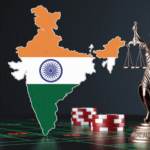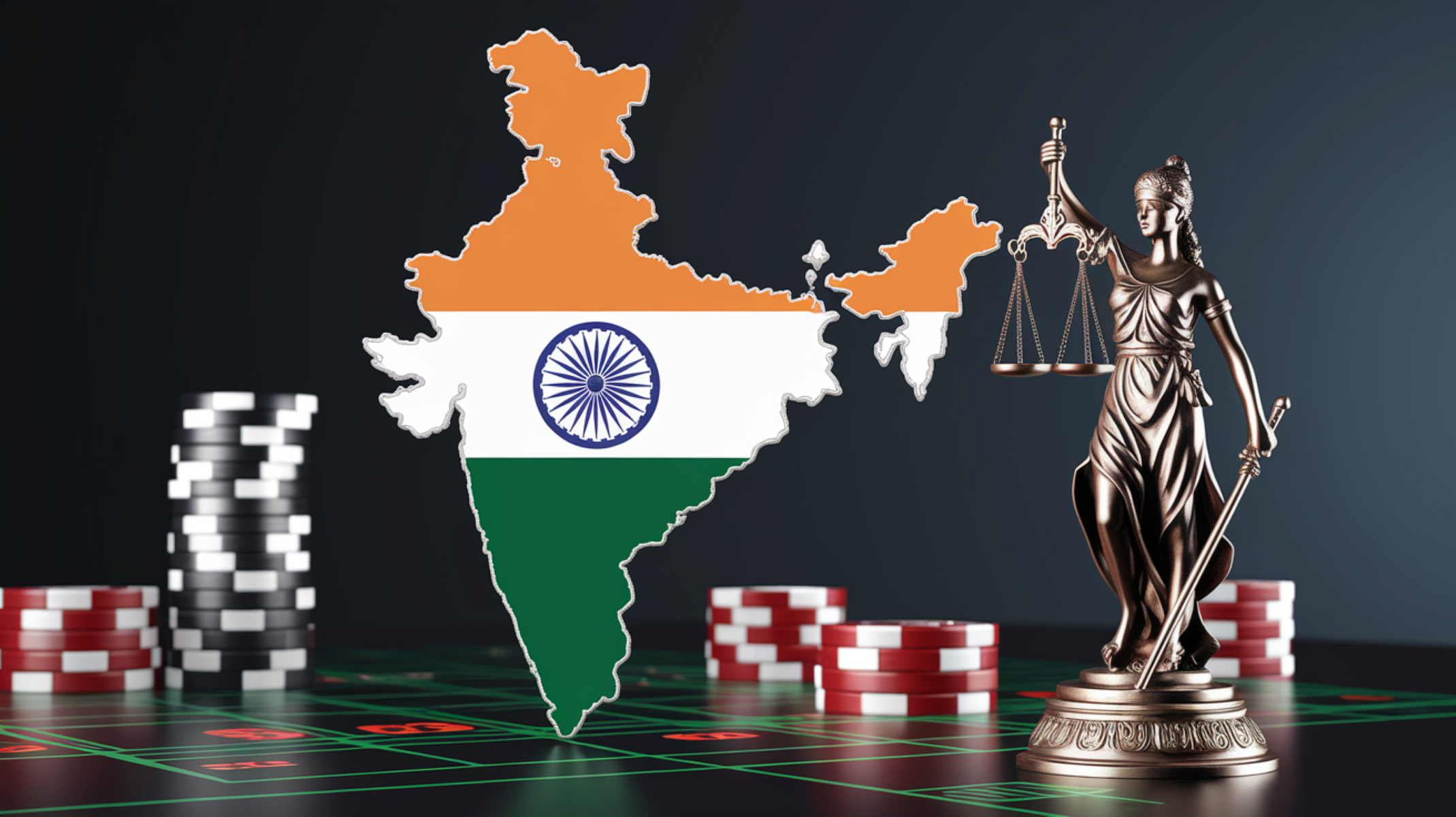Let’s face it—gambling in India is kind of like walking through a maze. Each state’s got its own rules, its own attitude, and its own idea of what’s okay and what’s not. Some say “yes” to casinos, others scream “no” even at the mention of online rummy. So if you’ve ever scratched your head wondering why Goa is the Vegas of India while Gujarat won’t even let you play cards for fun, you’re not alone.
What’s the Deal with Gambling Laws in India?
India doesn’t have a single, all-encompassing law when it comes to gambling. Instead, gambling laws are governed by individual states, which have the authority to create and enforce their own regulations. This decentralized approach is rooted in the Constitution of India, where gambling is classified as a “State Subject,” meaning it falls under the jurisdiction of each state. Because of this, the legal status of gambling activities can vary significantly from one state to another. In some states, gambling is tightly regulated, while in others, it is outright banned, leaving citizens in a state of confusion over what is allowed and what isn’t.
The absence of a uniform national law means that India has a patchwork of gambling regulations. While some states like Goa and Sikkim have established their own legal frameworks for casinos and online gambling, others, like Gujarat and Tamil Nadu, have taken a hard stance against it. This creates a disjointed landscape, where people living in one state can legally place bets, while those in a neighboring state may face legal consequences for doing the same thing. The result is a complex and sometimes contradictory system that leaves both operators and players navigating a maze of legalities.
The differences in state-level regulations have also led to a situation where the industry is largely unregulated in certain parts of India, especially concerning online gambling. States like Nagaland have taken steps toward licensing skill-based games like rummy and poker, while others, like Maharashtra, have yet to introduce comprehensive laws to deal with online betting. This legal uncertainty around online gambling means that operators are often left to interpret the law on their own, sometimes leading to legal gray areas where players can find themselves in a precarious position.
For both local players and international operators, understanding the legal landscape can be daunting. The confusion around gambling laws in India means that what is considered legal in one state could be illegal in another. This lack of uniformity has sparked debates about whether a centralized gambling regulation is needed to bring clarity and order to the industry. While some states have been proactive in developing their own regulations, the inconsistency between them shows that there is still much to be done in terms of creating a cohesive national framework for gambling in India.
The Backbone Law: The Public Gambling Act of 1867
| Key Element | Description | Impact on States | States with Custom Laws | States with Public Gambling Act Applied |
| Original Purpose | The Public Gambling Act of 1867 was designed to prevent the establishment and operation of gambling houses and activities. | Applied universally across British-India, but with evolving relevance as states gain autonomy. | Mostly non-existent today due to state-level autonomy. | Goa, Sikkim, and a few others still have state-specific laws. |
| Scope of the Law | The Act specifically prohibits public gambling, but it is limited to physical gambling houses, not covering online gambling. | The law became less relevant with the rise of online gambling. | States like Goa and Sikkim have updated laws to include casinos and other gambling activities. | States that haven’t updated laws continue to follow this act. |
| State Autonomy | Under India’s federal system, states have the authority to create and enforce their own gambling regulations. | This allows states to tailor gambling laws to their local context. | Goa, Sikkim, Nagaland, and others have taken advantage of their powers to regulate gambling. | States without independent gambling laws still rely on this Act. |
| Current Relevance | Today, the Act is largely outdated, as states now have the power to enact laws that better reflect modern gambling trends, including online betting and casinos. | States have increasingly moved away from the Act’s restrictions. | Goa, Sikkim, and Nagaland offer legal gambling options, while others focus on banning or restricting it. | States like Gujarat and Tamil Nadu strictly follow the Act’s bans. |
| Enforcement | The law is enforced by local police authorities, and penalties include fines and imprisonment for those involved in gambling operations. | Enforcement is less stringent in states with their own laws. | States with comprehensive gambling laws implement regular checks and licenses for operators. | States under the Act may have fewer enforcement actions due to lack of clarity. |
States That Follow the Public Gambling Act (Mostly Unchanged)
Some states in India have opted to stick with the original provisions of the Public Gambling Act of 1867, making minimal or no amendments to the law. These states continue to prohibit public gambling, but the laws often leave room for ambiguity when it comes to online gambling or skill-based games. While there may be variations in how strictly these laws are enforced, the following states largely adhere to the old-school law, and their stance on gambling remains relatively unchanged:
- Uttar Pradesh
- Gambling, including casinos and public betting houses, is illegal.
- The law primarily focuses on land-based gambling establishments.
- Ambiguity exists regarding the legal status of online gambling and skill-based games like rummy and poker.
- Madhya Pradesh
- Public gambling is banned under the original law.
- There are limited regulations for gambling establishments or casinos.
- The legality of online gaming platforms and skill-based games remains unclear.
- Haryana
- The Public Gambling Act is still in effect, prohibiting public gambling activities.
- No clear distinction is made between traditional gambling and online games.
- The state has not yet introduced specific laws to address modern forms of gambling.
- Punjab
- Public gambling remains illegal under the 1867 Act.
- Casinos and betting houses are not legally permitted.
- While there is no formal regulation on online gambling, it is largely treated under the same restrictions as physical gambling.
- Bihar
- The state still follows the Public Gambling Act, making it illegal to run or visit a gambling house.
- Skill-based games and online gambling platforms are not explicitly addressed by the current laws.
- While the law does not provide a clear stance on online gambling, traditional gambling remains prohibited.
- Uttarakhand
- Gambling laws in Uttarakhand are still governed by the Public Gambling Act.
- Online gaming is not specifically addressed, and the state follows a general ban on gambling houses.
- Jharkhand
- The state adheres to the Public Gambling Act of 1867.
- Online gambling, including poker and other skill-based games, is not explicitly regulated.
- Public gambling remains banned, and casinos are not allowed.
Let’s Break It Down: State-by-State Gambling Laws
Gambling laws in India are diverse, and they vary significantly from state to state. Some states have embraced certain forms of gambling, while others remain strict or have inconsistent laws. This patchwork of regulations makes it difficult for both players and operators to navigate the legal landscape. Let’s take a closer look at how different states approach gambling, from Goa, the Las Vegas of India, to Kerala’s fluctuating stance on skill-based games.
Goa is one of the most well-known states for legal gambling in India. Both offshore and onshore casinos are allowed here, making it one of the few states where you can legally walk into a casino, sip a drink, and play your favorite table games like roulette. This makes Goa the go-to destination for anyone seeking a legitimate gambling experience in India. The state also allows lotteries, and skill games are permitted, creating an environment where both casual and serious players can enjoy different forms of gambling. However, despite the bustling casino scene, online gambling isn’t explicitly regulated, leaving a certain degree of ambiguity surrounding the status of online betting platforms.
Sikkim has taken a progressive stance in terms of gambling laws, particularly in the realm of online gambling. It was the first state to legalize online gambling, and it operates a licensing model for online gaming platforms. This pioneering move allowed the state to regulate online casinos and sports betting, something that no other state in India had done at the time. In addition to online gambling, Sikkim also permits traditional casino gambling at select locations. The state runs lotteries and legalizes skill games, making it a more favorable environment for online gaming enthusiasts. While Sikkim’s licensing system set a precedent for online gambling in India, it hasn’t fully realized the potential of online platforms due to some challenges in the market.
Nagaland is one of the few states where online skill-based games, such as poker and rummy, are not just allowed but also regulated through proper licensing. This forward-thinking approach has attracted skill-based gaming operators and players alike, as they can legally participate in online poker and other games of skill. However, Nagaland does not allow traditional casino gambling. The state has focused on creating a niche for skill-based online games, recognizing the growing popularity of games like rummy and poker. It offers licenses to operators who wish to host these types of games online, thus ensuring that the industry remains regulated and fair. While the state has taken a progressive step in promoting skill games, the absence of casino gambling keeps it somewhat limited compared to other regions like Goa.
Indian States Gambling Overview
| State | Casinos Legal | Online Gambling | Lotteries | Skill Games Legal |
| Goa | Yes | Not regulated | Yes | Yes |
| Sikkim | Yes (few) | Licensed | Yes | Yes |
| Nagaland | No | Skill only | Yes | Licensed |
| Maharashtra | No | Prohibited | Yes | Unclear |
| Tamil Nadu | No | Banned | Banned | Banned |
| Kerala | No | Partially banned | Yes | Unclear |
| Meghalaya | Yes (new) | Licensing in progress | Yes | Yes (in theory) |
| Gujarat | No | Banned | Banned | Banned |
| Delhi | No | No clear law | Yes | Legal (skill only) |
Online Gambling: The Big, Gray Elephant in the Room
Online gambling in India is one of those legal gray areas that keeps both operators and players on their toes. While the physical gambling laws in various states are somewhat clear, online gambling remains a different story. Most Indian states haven’t explicitly addressed online gambling, creating a significant gap in regulation. Here are some key things to consider when navigating the complex world of online gambling in India:
- Lack of Central Legislation: There is no national law that clearly prohibits or regulates online gambling across India. This leaves the matter largely up to the states to decide how to handle it, contributing to a patchwork of inconsistent laws and regulations.
- State-Level Regulation: Some states like Sikkim and Nagaland have stepped forward to regulate online gambling. Sikkim, for instance, became the first state to introduce a licensing system for online gambling platforms. Nagaland, on the other hand, legalized skill-based games like poker and rummy online, creating a legal framework for these activities.
- Online Skill Games: While many states have been silent on the issue of online gambling, a few have made moves to regulate skill-based games such as rummy and poker. However, the status of these games varies greatly from state to state, with some states, like Kerala and Tamil Nadu, banning these games outright despite them being considered skill-based.
- Attempts to Ban Online Gambling: In states like Tamil Nadu and Kerala, authorities have attempted to ban online gambling activities, particularly when it comes to real-money online games such as poker, rummy, and fantasy sports. These moves have sparked debates about whether online skill games should be treated differently from games of chance.
- Ambiguity and Uncertainty: The absence of clear federal guidelines and the varied approaches from states have left a lot of ambiguity surrounding online gambling. This legal uncertainty makes it difficult for players to know what is and isn’t legal, and it poses challenges for operators looking to offer services in India.
- Lack of Enforcement: Even in states where online gambling is prohibited or under heavy scrutiny, enforcement can be inconsistent. Players may find it easy to access international gambling sites, and online platforms often operate in a legal gray area, making enforcement of these bans difficult.
- Pressure from the Public and Media: The push to regulate or ban online gambling in certain states has been influenced by public outcry and media coverage, particularly about the potential for gambling addiction. Politicians and lawmakers often cite these concerns as reasons for placing restrictions on online gambling.







